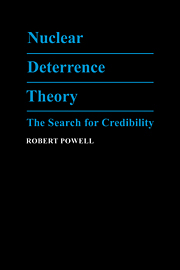Book contents
- Frontmatter
- Contents
- Preface
- 1 Introduction
- 2 The nuclear revolution and the problem of credibility
- 3 The dynamics of nuclear brinkmanship
- 4 Stability and longer brinkmanship crises
- 5 Crisis stability in the nuclear age
- 6 Stability and the lack of control
- 7 The strategy of limited retaliation
- 8 An appraisal
- Appendix Some introductory notes on game theory
- References
- Index
1 - Introduction
Published online by Cambridge University Press: 13 October 2009
- Frontmatter
- Contents
- Preface
- 1 Introduction
- 2 The nuclear revolution and the problem of credibility
- 3 The dynamics of nuclear brinkmanship
- 4 Stability and longer brinkmanship crises
- 5 Crisis stability in the nuclear age
- 6 Stability and the lack of control
- 7 The strategy of limited retaliation
- 8 An appraisal
- Appendix Some introductory notes on game theory
- References
- Index
Summary
Even after the advent of secure second-strike capabilities marked the nuclear revolution by rendering defense impossible, force remained the final arbiter of disputes among states in the anarchy of international politics. A state could still try to use force or threaten to use it if that seemed to be in its best interest. Of course, one state might do this in an effort to prevent another state from resorting to violence. But that only underscores the point that states could use force if such use seemed to them to further their ends. The nuclear revolution did, however, undercut the relation that had previously existed between the use or threatened use of force and states' attempts to secure their interests, for this relation implicitly depended on defense. How has the nuclear revolution changed the relation between force or the threat of it and states' political objectives? Explaining this change is the central problem for nuclear deterrence theory.
This book examines the ways in which nuclear deterrence theory has tried to solve this problem. The book aims at two ends. The first is to extend the existing formal analyses of some aspects of deterrence theory's attempted solutions. These include the strategy that leaves something to chance, crisis stability, and the strategy of limited retaliation. Formalization often comes at a high price, and that is certainly the case with the models developed here. Much must be sacrificed in the name of simplification and tractability. But these sacrifices bring compensating advantages.
- Type
- Chapter
- Information
- Nuclear Deterrence TheoryThe Search for Credibility, pp. 1 - 5Publisher: Cambridge University PressPrint publication year: 1990



